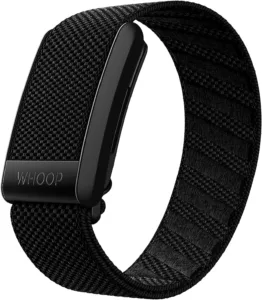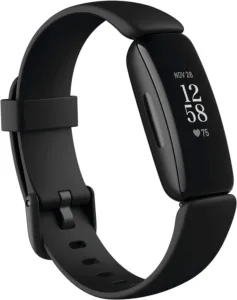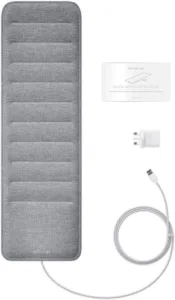![]()
Good sleep is essential for our overall well-being, and keeping track of our sleep patterns can provide valuable insight into our sleep quality. Sleep trackers have become increasingly popular in recent years, offering a convenient way to monitor and understand our sleeping habits. In this comprehensive guide, we will explore the different types of sleep trackers available, discuss the science behind them, and highlight the key features to look for when choosing the best sleep tracker for your needs.
Top 3 Best Sleep Trackers
- WHOOP 4.0. WHOOP is a cutting-edge wearable fitness device that continuously monitors vital data like heart rate, sleep, and activity. With its science-backed insights, it helps users optimize performance and understand their overall health. The WHOOP Journal tracks daily behaviors, and the waterproof design ensures days of uninterrupted monitoring on a single charge. Elevate your fitness journey with WHOOP’s revolutionary approach to health and wellness.
- Fitbit Inspire 2. Maximize your workouts with the Fitbit Inspire 2. Get a Daily Readiness Score for exercise guidance, earn active zone minutes, and use various exercise modes to track your goals. Monitor all-day activity, including steps, distance, and calories burned. Utilize 24/7 heart rate tracking for accurate calorie burn measurement. With up to 10 days of battery life, track your progress without frequent charging. Assess your sleep quality with detailed sleep tracking, and enjoy the swim-proof design for continuous inspiration from the shower to the pool. Elevate your fitness journey with Fitbit Inspire 2.
- Withings Sleep. Elevate your sleep with Withings Sleep: detailed insights, Sleep Score, and snore detection. Continuous heart rate tracking under the mattress, compatible with most. Access data via Wi-Fi and share a sleep diary with your doctor. Also, a smart switch with Alexa Skill integration.
Understanding Sleep Trackers
Before diving into the world of sleep trackers, it is important to understand how they work and the benefits they offer. Sleep trackers utilize various sensors and algorithms to collect data on your sleep patterns, including duration, quality, and efficiency. By analyzing this data, sleep trackers can provide valuable insights into your sleep habits, helping you make informed decisions to improve your sleep quality.
The Science Behind Sleep Trackers
Sleep trackers rely on scientific principles to gather data about your sleep. These devices typically use a combination of accelerometer and heart rate sensors to measure movement and heart rate variability during sleep. By analyzing these factors, sleep trackers can determine the different sleep stages you go through each night, including deep sleep, light sleep, and REM sleep. Understanding your sleep stages can provide valuable insight into the quality of your sleep and help identify potential sleep disorders.
During deep sleep, your body experiences physical restoration and repair. This is the stage where your muscles and tissues are repaired, and growth hormones are released. Light sleep, on the other hand, is a stage where your body prepares for deep sleep or waking up. It is during this stage that your brain processes memories and emotions. REM sleep, also known as rapid eye movement sleep, is the stage where most dreaming occurs. It is essential for cognitive function, memory consolidation, and emotional regulation.
By tracking your sleep stages, sleep trackers can provide you with a comprehensive picture of your sleep architecture. This information can help you understand if you are getting enough deep sleep, which is crucial for physical restoration, or if you are spending too much time in light sleep, which may indicate poor sleep quality.
Benefits of Using Sleep Trackers
Using a sleep tracker can offer several benefits. Firstly, it allows you to gain a comprehensive understanding of your sleep patterns, helping you identify any factors that may be affecting your sleep quality. For example, if you notice that you consistently have a lower amount of deep sleep, you may want to explore relaxation techniques or adjust your sleep environment to promote better rest.
Secondly, sleep trackers can help you establish a regular sleep routine by providing insights into your sleep/wake patterns. By analyzing the data collected over time, you can identify the optimal bedtime and wake-up time that aligns with your natural sleep cycles. This can help regulate your body’s internal clock and improve sleep efficiency.
Lastly, having access to this data can empower you to make informed decisions and take proactive steps towards improving your sleep health. Armed with knowledge about your sleep patterns, you can experiment with different strategies, such as adjusting your sleep environment, practicing relaxation techniques, or incorporating sleep-promoting habits into your daily routine.
It is important to note that while sleep trackers can provide valuable insights, they are not a substitute for professional medical advice. If you suspect you have a sleep disorder or are experiencing persistent sleep issues, it is always best to consult with a healthcare professional who can provide personalized guidance and recommendations.
Types of Sleep Trackers
Sleep trackers come in various forms, each with its own set of advantages and disadvantages. Let’s explore the different types:
Wearable
Wearable sleep trackers, such as wristbands or smartwatches, are the most common type of sleep trackers. These devices are convenient and comfortable to wear, allowing you to track your sleep without any additional effort.
One of the advantages of wearable sleep trackers is their ability to provide continuous and real-time sleep data. By wearing a sleep tracker on your wrist, it can monitor your movement and heart rate throughout the night, giving you a detailed analysis of your sleep patterns. This information can be valuable in identifying any disruptions or issues that may be affecting your sleep quality.
In addition to sleep tracking, many wearable sleep trackers offer additional features such as heart rate monitoring, sleep stage analysis, and even smart alarms that wake you up at the optimal time in your sleep cycle. These features can further enhance your sleep-tracking experience and help you optimize your sleep habits.
CareClinic, a leading health app, offers a comprehensive sleep-tracking feature that can be integrated with wearable sleep trackers, providing users with detailed sleep analysis and personalized insights. This integration allows you to conveniently view and analyze your sleep data within the app, making it easier to track your progress and make informed decisions about your sleep health.
Non-Wearable
For those who prefer not to wear a sleep tracker, non-wearable sleep trackers offer an alternative solution. These devices typically use sensors that are placed near your bed to detect your movement and breathing patterns during sleep.
Non-wearable sleep trackers are often more affordable than wearable options and can provide accurate sleep data. By placing a sensor under your mattress or on your bedside table, these trackers can monitor your sleep without any physical contact.
One advantage of non-wearable sleep trackers is their simplicity and ease of use. There are no devices to wear or charge, making them a convenient option for those who don’t want any additional hassle. Additionally, non-wearable sleep trackers can be easily shared among multiple users, making them suitable for families or couples who want to track their sleep together.
CareClinic also offers a non-wearable sleep tracking feature that can be used by placing your smartphone on your mattress. This convenient option eliminates the need for additional devices and allows you to track your sleep without any extra effort.
App-Based
With the advancement of technology, app-based sleep trackers have become increasingly popular. These trackers utilize the sensors already present in your smartphone to gather data on your sleep patterns.
By simply placing your smartphone near your bed, the app can detect movement and analyze your sleep quality. This makes app-based sleep trackers a convenient option for those who don’t want to invest in additional devices or wearables.
One advantage of app-based sleep trackers is their accessibility. Since most people already have smartphones, there is no need to purchase any additional equipment. This makes app-based sleep trackers a cost-effective solution for those who want to track their sleep without breaking the bank.
CareClinic’s sleep tracking feature, available within the app, provides accurate sleep data and offers personalized sleep improvement recommendations. By analyzing your sleep patterns and providing actionable insights, the app can help you make positive changes to your sleep habits and overall well-being.
Whether you prefer wearable sleep trackers, non-wearable options, or app-based tracking, there is a sleep tracker out there to suit your needs. By monitoring your sleep patterns and making informed decisions about your sleep health, you can improve the quality of your sleep and wake up feeling refreshed and rejuvenated.
Key Features to Look for in a Sleep Tracker
When choosing a sleep tracker, there are several key features to consider:
Accuracy of Data
Accuracy is crucial when it comes to sleep tracking. Look for sleep trackers that use advanced sensors and algorithms to provide accurate sleep data. CareClinic’s sleep tracking feature ensures high accuracy by leveraging its sophisticated algorithms and integration with various wearable devices.
Advanced sensors in sleep trackers are designed to detect even the slightest movements during sleep. These sensors can differentiate between light sleep, deep sleep, and REM sleep, providing you with a comprehensive analysis of your sleep patterns. With the help of advanced algorithms, sleep trackers can accurately determine the duration and quality of your sleep, allowing you to make informed decisions about your sleep habits.
Comfort and Ease of Use
A sleep tracker should be comfortable to wear or use, allowing you to sleep naturally without any disturbance. Opt for devices that are lightweight and have adjustable straps. Additionally, app-based sleep trackers like CareClinic offer a user-friendly interface, making it easy to set up and navigate through the sleep-tracking process.
Some sleep trackers come in the form of wristbands or smartwatches, while others can be placed under your pillow or mattress. The choice depends on your personal preference and comfort level. Wristbands and smartwatches are convenient for those who prefer wearing something on their wrists while sleeping, while under-pillow or under-mattress trackers are ideal for those who don’t want any physical contact during sleep.
Battery Life and Connectivity
If you choose a wearable sleep tracker, consider the battery life and ease of connectivity. Look for devices that offer long battery life to ensure uninterrupted sleep tracking. Additionally, ensure that the sleep tracker seamlessly connects to your smartphone or other devices for data synchronization and analysis.
Long battery life is essential to avoid frequent charging interruptions and to ensure that your sleep tracker can monitor your sleep throughout the night. Some trackers come with wireless charging capabilities, making it even more convenient to keep them powered up.
Connectivity is another important aspect to consider. Sleep trackers that can sync with your smartphone or other devices allow you to easily access and analyze your data. This can help you identify patterns and make necessary adjustments to improve your sleep quality.
When choosing a sleep tracker, prioritize accuracy, comfort, ease of use, battery life, and connectivity. By considering these key features, you can find a sleep tracker that suits your needs and helps you achieve better sleep.
Manage Your Health Using CareClinic App
The CareClinic App is your comprehensive solution for managing and improving your sleep quality. With personalized sleep tracking features, the app integrates seamlessly with wearable devices to offer detailed analysis and actionable insights. Expect features like sleep stage recording, trend analysis, and tailored recommendations that work together to enhance your sleep patterns. By consistently tracking your sleep and related health habits within the CareClinic App, you can uncover the keys to restful nights and energized mornings. Experience the benefits of informed self-care and join the community of users achieving improved health outcomes. Install the CareClinic App today and embark on a journey to better sleep and overall well-being.

 WHOOP 4.0
WHOOP 4.0 Fitbit Inspire 2
Fitbit Inspire 2 Withings Sleep
Withings Sleep
